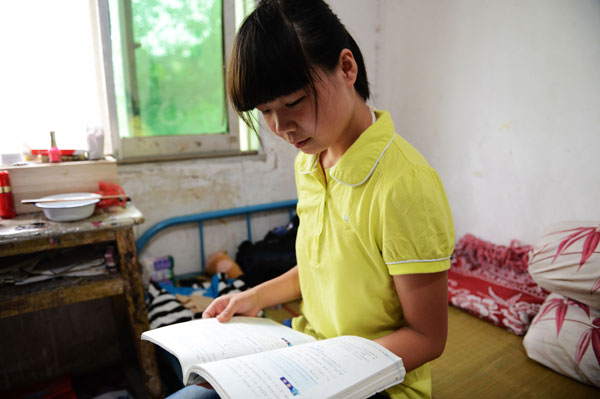No longer at home in their hometowns
Updated: 2013-05-30 03:20
By He Dan and Xiang Mingchao in Xinyang, Henan (China Daily)
|
||||||||
Living alone
When it comes to statistics, Gao is far from alone.
In May the All-China Women's Federation released a study — based on data from the 2010 census — that showed China has more than 61 million left-behind children under 18, about 38 percent of all minors in rural areas. The figure represents an increase of 2.4 million since 2005.
 |
|
Wang Tingting, 16, from Quanhe No 1 Middle School, prepares for a lesson. Wang lives with her 15-year-old brother while their parents work in Zhejiang province. |
Arguably more worrying, the foundation estimated that 2 million of these children live alone without any adult guardian.
A survey of 1.26 million children left behind in rural areas found the older the child, the bigger the chance they live alone. Of those aged 15 to 17, about 6 percent are entirely self-sufficient, the foundation report said.
Wang Tingting, 16, lives in Gushi county with only her younger brother for company. Their parents work in Zhejiang province.
"We used to live with our grandmother in the village, but after we started middle school two years ago it became too far to travel," Wang said, explaining how the siblings came to share a two-bedroom apartment their parents bought near the campus. "She couldn't move with us because she had to feed her cattle and grow wheat," she said.
Wang and her brother receive a weekly allowance of 60 yuan ($10) from their grandmother, but she said her brother has sometimes spent all the money by midweek, leaving them without enough for meals.
Wang Binglin, 36, the sibling's father, later said in a phone interview that leaving his children alone in his hometown was "the only way".
"We're away so that we can provide a better life for our children, as growing crops can't guarantee that," said the decorator, who lives in Hangzhou with his wife, who works at a garment factory.
"We gave up the idea of bringing the children with us, because if we did all our earnings would be spent on fees to enroll them in school," he said.
The first concern many people will have about children being left home alone is safety, with youngsters vulnerable to accidents and criminals.
Gao said her home was broken into and ransacked while she was out, leaving a mass of broken furniture.
"My neighbor, who helps look after the house, told me about it, but I didn't call the police because these things happen a lot in villages," she said. "Besides, the thief took nothing because we have nothing of great value."
Children left home alone also face more long-term side effects, according to teachers and psychologists.
Gao, for example, is an academic achiever and ranks in the top 10 in her class. The principal at her school assures her she will have no problem getting into a key senior high school. Yet she is considering not going to college, as she has heard it costs at least 100,000 yuan for four years of undergraduate study.
"My dad is 60 now, and his health is ruined after years of hard work," she said. "I don't want to let him sacrifice too much."
For Wang Tingting and her brother, who are in the same class at Quanhe No 1 Middle School, their education may end even sooner. Li Li, a teacher at the school, said the duo show little interest in studying and are rarely punctual for class.
"Wang Tingting has even talked about dropping out," he said. "Since they are both going through puberty, I often see big emotional ups and downs."

 Michelle lays roses at site along Berlin Wall
Michelle lays roses at site along Berlin Wall
 Historic space lecture in Tiangong-1 commences
Historic space lecture in Tiangong-1 commences
 'Sopranos' Star James Gandolfini dead at 51
'Sopranos' Star James Gandolfini dead at 51
 UN: Number of refugees hits 18-year high
UN: Number of refugees hits 18-year high
 Slide: Jet exercises from aircraft carrier
Slide: Jet exercises from aircraft carrier
 Talks establish fishery hotline
Talks establish fishery hotline
 Foreign buyers eye Chinese drones
Foreign buyers eye Chinese drones
 UN chief hails China's peacekeepers
UN chief hails China's peacekeepers
Most Viewed
Editor's Picks

|

|

|

|

|

|
Today's Top News
Shenzhou X astronaut gives lecture today
US told to reassess duties on Chinese paper
Chinese seek greater share of satellite market
Russia rejects Obama's nuke cut proposal
US immigration bill sees Senate breakthrough
Brazilian cities revoke fare hikes
Moody's warns on China's local govt debt
Air quality in major cities drops in May
US Weekly

|

|








